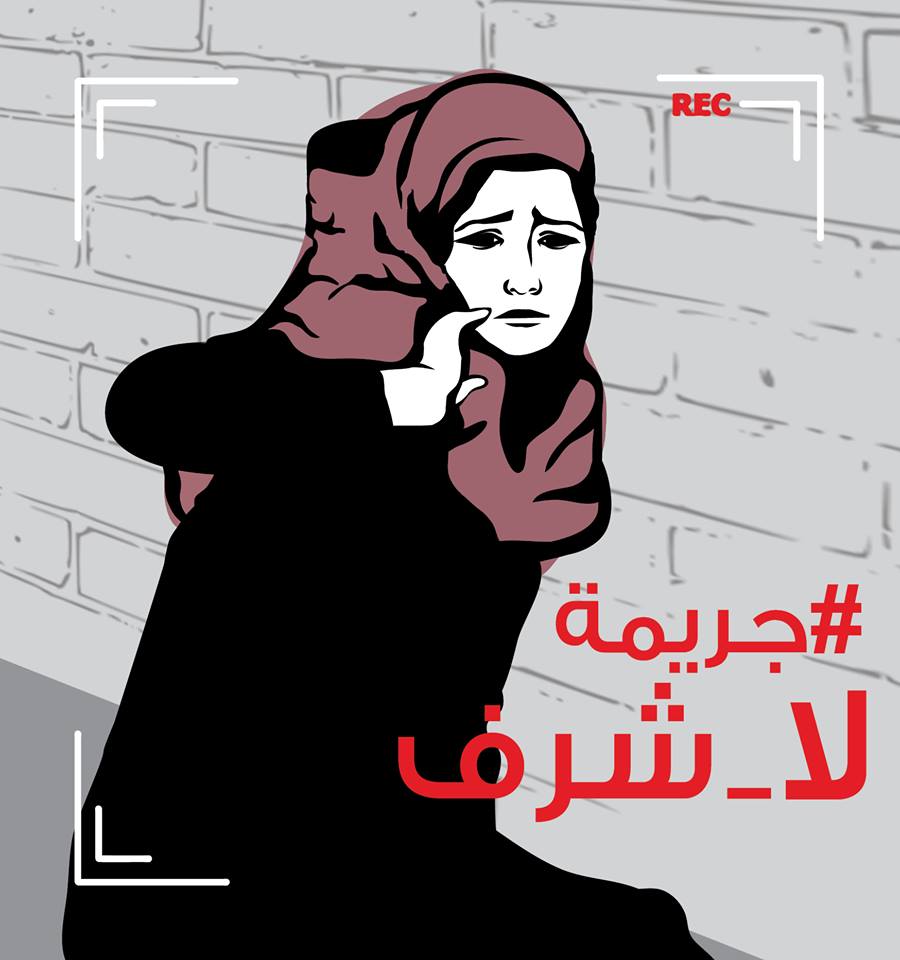
Crimes Without Honor: Seeking Justice for Victims of Sexual and Gender Based Violence
An illustration of Rasha Bseis, who was killed by her brother late last month, has been shared widely on social media. The caption reads, ‘a crime of no honor.’ Source unknown.
In late August, a video appeared on social media in which a woman from Afrin accuses the leader of a local militia of rape. The woman, Isra Yousef Khalil, openly identifies herself and details her experience of several assaults, adding that other women have suffered similar crimes at the hands of the accused, Mohammad Jasim, and other fighters in the Sultan Suleiman Shah Brigade. The rampant human rights violations of the Suleiman Shah Brigade and its parent organization, Sultan Murad, have been widely reported (including by OHCHR and Amnesty International), but Khalil’s testimony, which has received tens of thousands of views, represents not just another crime, but also a rare outlier in a culture in which sexual violence is often considered a taboo topic, with victims expected to remain silent about the abuse they suffered and perpetrators rarely held accountable. In fact, Khalil’s video resulted in pushback from the accused and many of his supporters, and she later rescinded her story, though it is unclear whether she was pressured to do so.
This taboo has drastic consequences, making it difficult to reach survivors for the purposes of documentation, medical care, and psychosocial support. Furthermore, the shame associated with sexual violence often inflicts additional harm on the survivor, particularly women, who may face social isolation, increased risk of suicide, and even honor killing at the hands of family. Late last month, a graphic video began circulating on social media in which a young man films himself killing his sister Rasha Bseis on camera in a so-called honor killing. Bseis allegedly had a relationship with a Turkish soldier, and a voice in the video can be heard saying “wash away your shame.” The video provoked widespread outrage, with commenters and activists rebranding the event as a ‘crime without honor’ and discussing the need for legal reforms to protect women like Bseis.
In 2015, SJAC published a study on societal attitudes towards SGBV. One rather surprising conclusion of the survey was that, while most individuals interviewed stated that they felt compassion for SGBV survivors and would like to see them receive support within the community, the same respondents generally stated that their communities would not be accepting of such survivors. While the latter is discouraging, the responses of individual interviewees suggest that there exists a potential for a cultural shift around how these crimes are discussed. Changing such norms is vital to the pursuit of justice and healing for SGBV survivors because justice will never be possible if survivors fear reporting and seeking the appropriate support.
Thus, public discussions, such as the ones that were encouraged by Khalil’s choice to share her story and are taking place in the aftermath of Bseis’s death, will be a necessary step in changing attitudes towards SGBV and can create momentum towards accountability for these crimes. The IIIM has stated its intent to pursue accountability for SGBV, and has noted that despite taboos, many survivors want to come forward to pursue justice. While individual survivors should never be pressured to publicly share their stories, they should be applauded and supported when they do so. Additionally, documentation and survivor support organizations should remove the onus from survivors to share their stories by speaking openly and frequently about the role of SGBV in the conflict, promoting justice for the survivors, and normalizing the types of medical and psychosocial services that survivors may require. Most importantly, they should support survivors by prioritizing them in refugee resettlement programs, putting in place better prevention measures in refugee camps, and advocating for legal reforms within Syria and the region that would allow women to register births outside of marriage and more easily pursue divorce. The surge of Syrian women choosing to divorce in Europe underscores this need, and the accompanying cases of violence perpetrated against women who seek divorce show the necessity of targeted support and protection. Finally, survivors of sexual and gender-based violence should have a role in the design of future justice processes, to ensure that the crimes they experienced are appropriately addressed. Survivors must feel that they are able to speak openly and society must be willing to shame and prosecute the perpetrators for the commission of their crimes.
SJAC, the UN Commission of Inquiry, and other organizations have made a concerted effort to collect information on SGBV and understand its role in the Syrian conflict. Despite ongoing documentation, however, the reality is that such efforts most likely cover only a small percentage of violations being committed within the country, and without acceptance and protection for survivors who speak out, there is a huge barrier to gathering information and grasping the full extent of such violations.
For more information or to provide feedback, please contact SJAC at [email protected] and follow us on Facebook and Twitter.